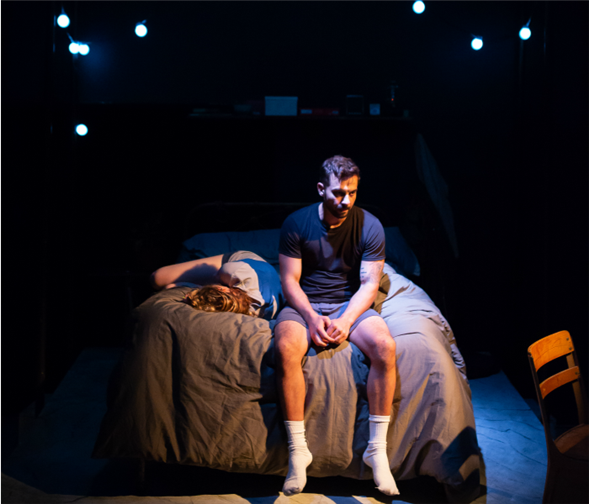Translate Page

The radical inclusiveness of Catya McMullen's Agnes
---
"I didn't set out to write about autism," says Catya McMullen about her world-premiere play Agnes at 59E59 Theaters. When she started on the script in the wake of Hurricane Sandy, she wanted to explore the drama that could ensue when characters with complex relationships were stuck together in close quarters to wait out a storm. Only later did she realize that one of those characters was on the autism spectrum. "I don't start with an idea," says McMullen of her creative process. "I start with a person."
In this case, that person was Charlie (played by John Edgar Barker), a lonely thirtysomething who has difficulty making emotional connections. "There was something about Charlie I could never crack," McMullen recalls. Although no one in her immediate family is on the spectrum, she has known people with autism. Once she concluded that Charlie had Asperger's syndrome, a type of high-functioning autism, the narrative began to fall into place.
In Agnes, Charlie, his overprotective sister, June (Laura Ramadei), and an assortment of friends and lovers are thrown into turmoil by the arrival of two hurricanes: one literal (the "Agnes" of the title), the other figurative (an old flame seeking shelter). Charlie's search for intimacy is at the core of the play, but he's not the only one on stage who's confused about romance, sex and family.
"Each of the characters reflects back at him," McMullen says, citing June's inability to commit to her girlfriend, Elle (Mykal Monroe), and their roommate, Ronan's (Hiram Delgado) tenuous grasp of boundaries. While most shows about people with autism have a disease-of-the-week-type focus -- a family coping with the diagnosis or the person overcoming some monumental hurdle -- Agnes is refreshing because it's about a circle of intimates, one of whom happens to be on the spectrum. It's a fact of his life, but it doesn't completely define him or his relationships with others.
To increase the show's authenticity and inclusivity, McMullen and Lesser America, the theatre company producing Agnes, made sure the autism community was represented both on stage and behind the scenes. "A member of our cast is on the spectrum, and members of our production team are as well," says McMullen.
The show also recently hosted a "relaxed performance" in order to make it accessible to audiences on the spectrum. Cast and crew were advised by experts from TDF's National Autism Friendly Performances department on how to adjust the show's technical elements to create a more sensory-friendly environment (reduced sound, dim house lights and other tweaks).
While there is no official count of people living with autism, the CDC estimates that 1 in 59 children in the U.S. has been identified with the disorder, and the rate of diagnosis increases each year. That makes Agnes both relevant and resonant.
Having done a "deep dive" into the science and culture of autism to write her play, McMullen isn't naive about the incredible struggles those with the condition face. But with Agnes she hopes to encourage neurotypical audience members to see themselves in people like Charlie.
"We all are striving for the same things and have the same feelings, but some of us have a diagnosis or a label attached to it," she says. "Sometimes that's comforting, because it explains something that's otherwise unexplainable, and sometimes it's profoundly limiting." Agnes asks audiences to see the person first, not the disability.
---
Regina Robbins is a writer, director, native New Yorker and Jeopardy! champion. She has worked with several NYC-based theatre companies and is currently a Core Company Member with Everyday Inferno Theatre.
Top image: Claire Siebers and John Edgar Barker in Agnes. Photos by Hunter Canning.
TDF Members: Go here to browse our latest discounts for dance, theatre and concerts.